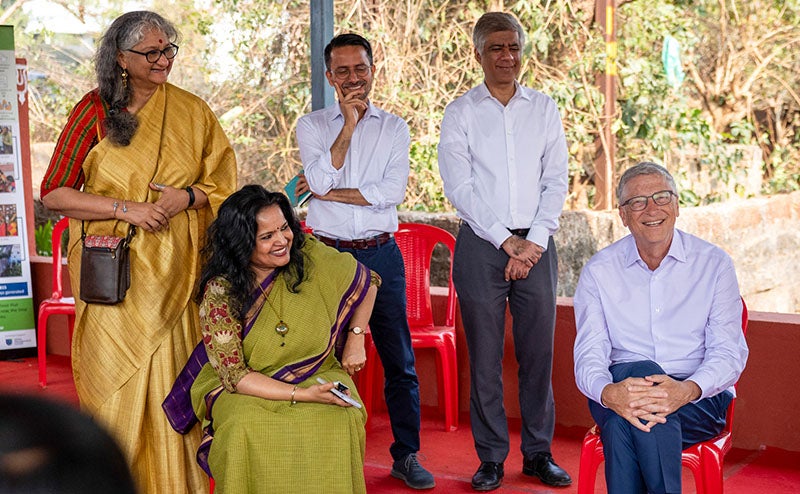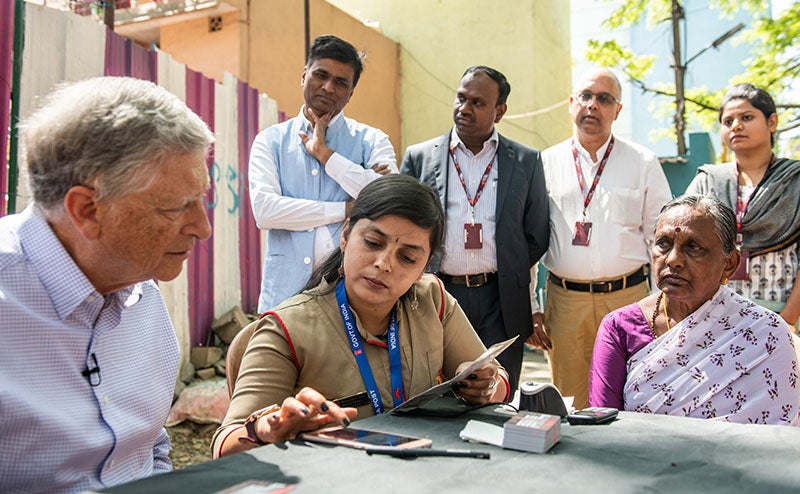One of the reasons why parts of the medical system often fail communities of color is because they’re not designed with them in mind.
I’ll be traveling to the United Kingdom and France next week to talk about how political leadership can accelerate innovation.
The first promise of any good politician is to make people’s lives better, and scientific research leading to innovation is one of the best ways to honor that promise. Until about 1700, there was basically no development. Almost everybody was poor, many were sick. One of every four children died. Average life expectancy was about 40 years, and 99 percent of people were illiterate. But then science came along and we started inventing—electricity, the steam engine, antibiotics, sanitation, vaccines, microprocessors, genetic medicine.
Science is the great giver—and we’re just at the beginning of what it can give.
The UK and France are natural homes for this message. The world owes an ongoing debt to the discoveries from both countries, including Alexander Fleming’s discovery of penicillin and Charles Darwin’s theory of evolution in Britain, and Louis Pasteur’s development of pasteurization and René Laënnec’s invention of the stethoscope in France.
The discoveries of these scientists weren’t just breathtaking insights into the nature of the universe; they became fuel for human progress. Progress is not a law of nature, like gravity. It takes work. Progress comes from innovation, which comes from research, which comes from investment, which comes in great part from government funding.
A powerful example is the story of penicillin. In 1928, when Alexander Fleming was doing research on antibacterial substances at St. Mary’s Hospital in London, he saw that mold that had developed by accident on a staphylococcus culture plate had created a bacteria-free circle around itself.
It was a historic discovery, but more work had to be done to determine the cause, isolate the active substance, and see if it could kill germs in a human being without also killing the human being. Dr. Howard Florey, Dr. Ernst Chain and other colleagues at Oxford were eager to pursue the work and wrote to the Medical Research Council (the UK government funding agency) requesting a research grant. They received £25, with the possibility of more later.
With the additional help of a grant from the Rockefeller Foundation, the team was able to demonstrate the effectiveness of the drug, which gained them the government support they needed to move to large-scale production in partnership with the United States. These efforts saved thousands of soldiers’ lives during World War II, where the number of deaths from battlefield infections plunged with the use of penicillin.
This same pattern of government support for medical research is underway in Britain today in many areas, including in malaria research. Malaria takes more than 700,000 lives each year—mostly in Africa and Southeast Asia. Its heaviest toll is on children. In 2003, the UK’s Department for International Development (DfID) and other European funders came together to fund a partnership between the Medicines for Malaria Venture and Novartis to develop a medicine tailored especially for children. This new drug, Coartem Dispersible, tastes sweet, is easy to take, is now available in 50 countries, and is estimated to have cured over 68 million cases of malaria. An analysis of the UK government research costs estimates that it has cost British taxpayers £1.10—1.40 per life saved. That is an amazing return on investment.
This is just one aspect of the UK’s work on malaria. DfID has also pledged an additional 25 million pounds to help develop a one-dose cure for malaria that could be available in the next three years. And GlaxoSmithKline is working with the Malaria Vaccine Initiative to develop the most promising vaccine candidate in history, which will enter final demonstration trials next year.
In another UK research initiative of historic consequence, the UK Medical Research Council, with funding from the DfID, launched a partnership to develop vaginal microbicides to protect women from HIV. HIV/AIDS is the leading cause of death globally in women age 15-44—in part because it is very difficult for a young woman to negotiate condom use with her partner. A vaginal microbicide puts protection directly in the hands of a woman, giving her an intervention she can use without her partner’s knowledge or consent. Two clinical trials have showed that the monthly dapivirine ring helped reduce new infections in women, with infection rates falling as much as 75 percent with near perfect use. This could avert millions of new infections and leave the world again indebted to British research.
The UK has also led in the search for an Ebola vaccine. The 2014 Ebola outbreak killed more than 11,000 people with an average fatality rate of 50 percent. One of the most important steps in containing an epidemic is to vaccinate around the outbreak, but in 2014, there was no Ebola vaccine and vaccine candidates sat on the shelves because there were no buyers. In 2015, late-stage studies conducted with funding by the UK’s Department for International Development, the Wellcome Trust, the Jenner Institute, and the Canadian government showed a vaccine candidate from Merck to be highly effective against Ebola. The UK is also supporting promising vaccine candidates from GSK and Johnson & Johnson. As a result, if there is a new Ebola outbreak, the response is likely to be far more swift and effective.
Every country on earth will benefit when we have an Ebola vaccine, when microbicides are perfected, when malaria is eradicated—but there is a special gain to the countries doing the research. First of all, when a country funds innovations that make life better for people around the world, it defines itself as a global leader. Second, research and development brings a huge benefit to the countries doing the research because it creates high-paying jobs, encourages the growth of talent, and builds up the scientific capacity of the country that pays for it.
When a country builds its own scientific capacity, the benefits it gets are far beyond what it can imagine. That’s because some of the greatest discoveries of science are insights that came when looking for something else. Scientists begin searching for the answer to one problem and discover the answer to many others. And once a country builds scientific talent, it can deploy it quickly to urgent areas.
In the midst of a pandemic, for example, a country with great scientific resources can far more quickly track a disease, invent diagnostic tests and develop treatments and vaccines. You can’t mobilize your talent if you haven’t already built it.
The importance of scientific research also stretches far beyond global health. Supplies of energy, water, food—which are central to the fight against poverty and crucial for easing the scarcity that is a cause of instability—are all problems that must be solved by science. And research into information technology can improve productivity in ways that lead to new jobs, economic growth and educational gains as well.
Whether the research is in global health or agriculture or information technology or energy, the dynamic is the same. Innovation comes from government spending on R&D plus the creative genius of the private sector which takes the findings from lab to market.
Here too, Europe is helping to lead the way. In the search for new energy sources, some of the most forward thinking companies are in France. Total, an oil company, and Engie, an electricity provider, have seen the need to transition from fossil fuels to clean-energy solutions. They are thinking about how to take biofuels, solar energy and other new energy innovations, many developed through government-sponsored R&D, and scale them to meet the demands of their global customers. This formula has led to the spread of so many great health interventions around the world. It has also led to the success of Microsoft, Apple, Google and other tech companies whose innovations built on the insights gained in government-funded research.
That’s the message that I’m bringing with me to Europe. I want to urge leaders here to take on our biggest problems through dramatic increases in scientific research—because we know that government-funded research can create jobs now, meet public needs soon, and lead to economic growth far into the future.
At the start of this post, I cited earlier the work of Charles Darwin. It’s clear enough by now that the key adaptive trait in human beings is our ability to discover and share new knowledge—to innovate. That’s why we’re here and Neanderthals aren’t. Innovation is what helps us flourish. To slow down on innovation now by missing the chance to boost research is to turn our back on our greatest strength. It’s replacing thinking with hoping. That’s not worthy of people who have big dreams for their children. We need to invest in research as if billions of lives depended on it—because they do.





